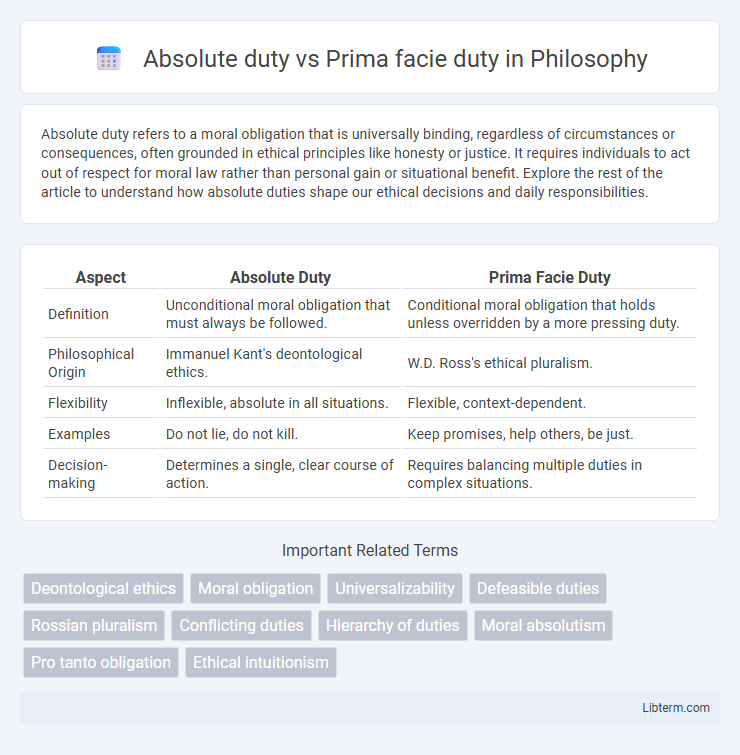Absolute duty refers to a moral obligation that is universally binding, regardless of circumstances or consequences, often grounded in ethical principles like honesty or justice. It requires individuals to act out of respect for moral law rather than personal gain or situational benefit. Explore the rest of the article to understand how absolute duties shape our ethical decisions and daily responsibilities.
Table of Comparison
| Aspect | Absolute Duty | Prima Facie Duty |
|---|---|---|
| Definition | Unconditional moral obligation that must always be followed. | Conditional moral obligation that holds unless overridden by a more pressing duty. |
| Philosophical Origin | Immanuel Kant's deontological ethics. | W.D. Ross's ethical pluralism. |
| Flexibility | Inflexible, absolute in all situations. | Flexible, context-dependent. |
| Examples | Do not lie, do not kill. | Keep promises, help others, be just. |
| Decision-making | Determines a single, clear course of action. | Requires balancing multiple duties in complex situations. |
Introduction to Moral Duties
Absolute duties are moral obligations that must be followed without exception, reflecting an unwavering commitment to ethical principles such as truth-telling and non-maleficence. Prima facie duties, introduced by philosopher W.D. Ross, represent conditional moral requirements that hold unless overridden by a more pressing duty in a specific context. Understanding the distinction between absolute and prima facie duties is crucial for navigating complex moral dilemmas and prioritizing ethical responsibilities effectively.
Defining Absolute Duty
Absolute duty refers to an ethical obligation that must be followed without exception, regardless of circumstances or consequences, grounding its authority in moral absolutes. It demands unwavering adherence to principles such as honesty, non-maleficence, and justice, making it a cornerstone in deontological ethics. Differing from prima facie duty, which allows for exceptions based on context and competing moral claims, absolute duty maintains strict, universal application.
Understanding Prima Facie Duty
Prima facie duty refers to an obligation that is binding unless it conflicts with a stronger duty in a particular situation, allowing for flexibility in ethical decision-making. It contrasts with absolute duty, which demands unconditional adherence regardless of circumstances. Understanding prima facie duty involves recognizing its role as a provisional commitment that can be overridden by more pressing moral responsibilities.
Historical Background and Key Philosophers
Absolute duty, rooted in Immanuel Kant's deontological ethics, demands unwavering adherence to moral laws regardless of consequences, emphasizing categorical imperatives as moral absolutes. Prima facie duty, introduced by W.D. Ross in the early 20th century, recognizes multiple conditional duties that may conflict, requiring practical judgment to determine the most pressing obligation in a given situation. These contrasting frameworks highlight evolving perspectives on moral obligation from rigid, universal rules to context-sensitive ethical decision-making.
Core Differences Between Absolute and Prima Facie Duties
Absolute duties demand unconditional adherence regardless of circumstances, representing moral obligations that cannot be overridden or ignored. Prima facie duties, however, are conditional and serve as initial moral principles that can be outweighed by stronger ethical considerations in conflicting situations. The core difference lies in the rigidity of absolute duties versus the flexible, context-dependent nature of prima facie duties.
Practical Examples of Absolute Duties
Absolute duties, unlike prima facie duties, demand strict adherence without exceptions, regardless of circumstances. For instance, the absolute duty not to lie requires complete honesty in all situations, while the duty not to torture forbids causing deliberate harm no matter the context. These duties serve as foundational ethical principles, guiding consistent moral behavior across diverse scenarios.
Real-World Applications of Prima Facie Duties
Prima facie duties, identified by philosopher W.D. Ross, guide ethical decision-making in real-world scenarios by providing flexible obligations that can be overridden when conflicting duties arise, unlike absolute duties which demand unwavering adherence. These duties, such as fidelity, beneficence, and justice, apply in professions like medicine, law, and business, where practitioners balance competing moral claims to determine the most ethically appropriate action. In medical ethics, for example, a prima facie duty to respect patient autonomy may be weighed against the duty to prevent harm, allowing physicians to make nuanced decisions tailored to each case.
Ethical Dilemmas: Resolving Duty Conflicts
Absolute duties demand unwavering adherence regardless of circumstances, presenting clear ethical imperatives with no room for exceptions. Prima facie duties are conditional obligations that may conflict, requiring careful evaluation to determine which duty takes precedence in complex moral situations. Ethical dilemmas arise when prima facie duties collide, necessitating critical judgment to resolve conflicts and uphold the most compelling moral responsibility.
The Relevance of Duties in Modern Ethics
Absolute duty demands unwavering adherence regardless of circumstances, forming a rigid ethical foundation crucial in deontological frameworks. Prima facie duty allows for flexibility, recognizing conflicting obligations and emphasizing context to guide moral decision-making. In modern ethics, balancing absolute and prima facie duties informs complex judgments in legal, medical, and professional fields, highlighting the need for principled yet adaptable moral reasoning.
Conclusion: Choosing Between Absolute and Prima Facie Duty
Choosing between absolute duty and prima facie duty depends on the context and ethical framework guiding the decision-making process. Absolute duties require unwavering adherence regardless of circumstances, ensuring moral certainty but potentially ignoring situational nuances. Prima facie duties offer flexibility by allowing conflicting obligations to be weighed and prioritized based on the specific scenario, promoting a balanced and context-sensitive ethical approach.
Absolute duty Infographic

 libterm.com
libterm.com